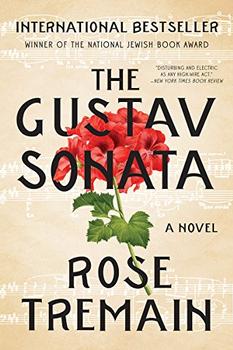Summary | Excerpt | Reviews | Beyond the Book | Readalikes | Genres & Themes | Author Bio

Critics' Opinion:
Readers' Opinion:
First Published:
Sep 2016, 256 pages
Paperback:
Sep 2017, 256 pages
 Book Reviewed by:
Book Reviewed by:
Kate Braithwaite
Buy This Book
' After the cleaning of the church, Gustav and Emilie would sit at the folding shelf in the tiny kitchen and drink hot chocolate and eat black bread with butter. The long winter day stretched ahead of them, cold and empty. Sometimes Emilie would go back to bed and read her magazines. She made no apology for this. She said children had to learn to play on their own. She said if they didn't learn to do this, they would never cultivate an imagination. Gustav would stare out of the window of his room at the white sky. The only toy he owned was a little metal train, so he'd set the train on the windowsill and shunt it backwards and forwards. Often, it was so cold by the window that Gustav's breath made realistic steam, which he puffed over the engine. At the carriage windows, people's faces had been painted on, all of them given expressions of blank surprise. To these startled people, Gustav would occasionally whisper, 'You have to master yourselves.'
The strangest place in the apartment building was the bunker underneath it. This had been built as a nuclear shelter, more usually referred to as an 'air protection cellar'. Soon, every building in Switzerland would be required to have one of these. Once a year, the janitor summoned the residents of the building, including the children, and they descended all together into the shelter. Behind them, as they went down the stairs, heavy iron doors were closed.
Gustav clung to Emilie's hand. Lights were turned on, but all they showed were more stairs going down and down. The janitor always reminded everybody that they should 'breathe normally', that the air filtration system was tested frequently for its absolutely perfect functioning. It wasn't, he said, called an 'air protection cellar' for nothing. But there was a strange smell about it, an animal smell, as though foxes or rats had nested here, living off dust or off grey paint licked from the walls.
Beneath the countless stairs, the shelter opened into a large storeroom, stacked from floor to ceiling with sealed cardboard boxes. 'You'll remember what we keep in the boxes,' the janitor said, 'enough food for all of us for approximately two months. And the water supply will be in the tanks over there. Clean drinking water. Rationed of course, because the mains supply – even if it was functioning – would be disconnected, in case of radiation contamination, but sufficient for all.'
He led them on. He was a heavy man. He spoke loudly and emphatically, as though he assumed he was with a party of deaf people. The sound of his voice echoed round the concrete walls. Gustav noticed that the residents always fell silent during the nuclear shelter tours. Their expressions reminded him of the painted people on his train. Husbands and wives huddled together. Old people clutched at each other to steady themselves. Gustav always hoped that his mother wouldn't let go of his hand.
When they got to the 'dormitory' part of the shelter, Gustav saw that the bunks had been built one above the other in stacks of five. To reach the top bunks, you had to climb a ladder, and he thought that he wouldn't like this, to be so far from the ground. Supposing he woke in the night, in the dark, and couldn't find Mutti? Supposing Mutti was on the very bottom bunk, or in a different row? Supposing he fell out of his bunk and landed on his head and his head exploded? He whispered that he didn't want to live there, in an iron bunk and with cardboard food, and Mutti said, 'It will probably never happen.'
'What will never happen?' he asked.
But Emilie didn't wish to say. 'You don't need to think about it yet,' she told him. 'The shelter is just a place of safety, in case the Russians – or anybody at all – ever took it into their heads to harm Switzerland.'
Excerpted from The Gustav Sonata by Rose Tremain. Copyright © 2016 by Rose Tremain. Used with permission of the publisher, W.W. Norton & Company, Inc. All rights reserved.




If there is anything more dangerous to the life of the mind than having no independent commitment to ideas...
Click Here to find out who said this, as well as discovering other famous literary quotes!
Your guide toexceptional books
BookBrowse seeks out and recommends the best in contemporary fiction and nonfiction—books that not only engage and entertain but also deepen our understanding of ourselves and the world around us.